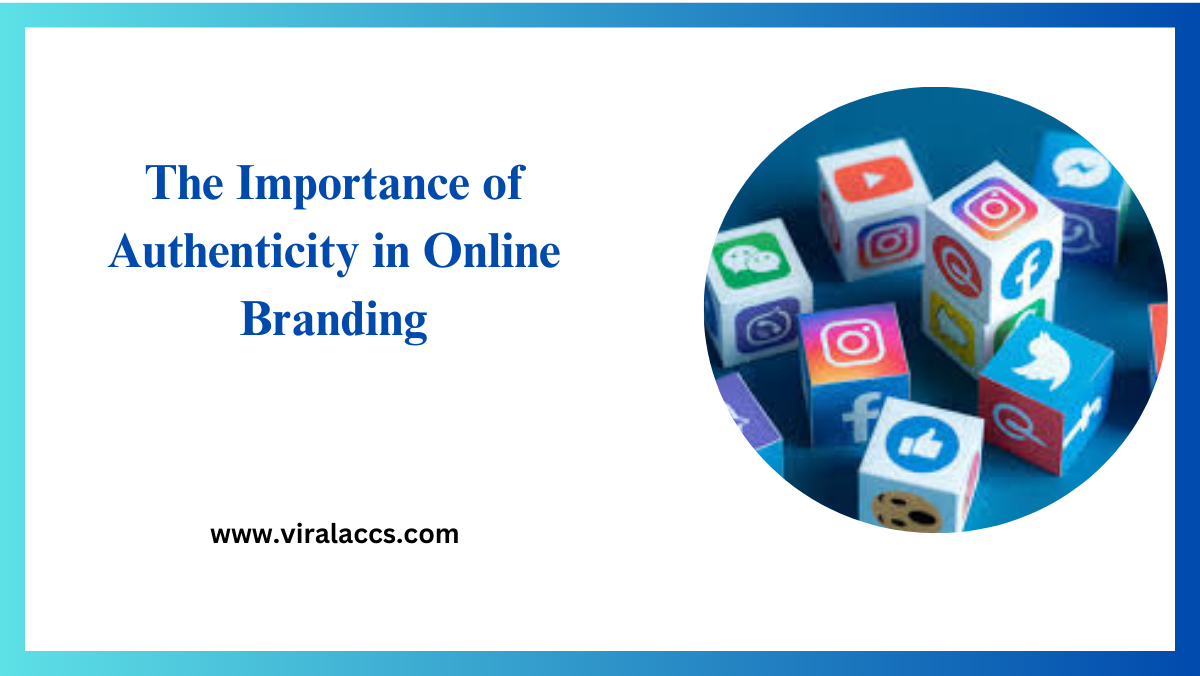In today’s fast-paced, digital-first world, where consumers are bombarded with endless options and noise, standing out is tougher than ever. Yet, one golden rule remains unchanged, and that’s the power of authenticity. For online branding, authenticity isn’t just a buzzword; it’s the secret sauce that can set your brand apart and build lasting trust with your audience.
Understanding the Essence of Authenticity in Branding
Authenticity in branding is about being genuine, Online Branding transparent, and true to what your brand stands for. It’s about aligning your company’s values with those of your audience and being consistent in your messaging and actions. Authentic brands are not afraid to show their vulnerabilities, admitting mistakes, and making amends when needed. They speak the truth, even when it’s inconvenient.
This transparency creates a deep emotional connection, fostering loyalty among consumers. When customers feel that a brand is real and relatable, they are more likely to engage with it and recommend it to others. Authenticity becomes the foundation of lasting customer relationships, rooted in mutual respect and trust.
When a brand is authentic, it doesn’t need to try too hard to convince customers Online Branding of its worth. Instead, its genuine nature speaks for itself, drawing in individuals who resonate with its ethos naturally. This authenticity is more critical now than ever, as customers increasingly demand honesty and integrity from businesses.
The Growing Importance of Authenticity Today
The digital landscape has made it easier for consumers to research and compare brands at the click of a button. With this newfound power, Online Branding they have become more discerning and less tolerant of insincerity. They can spot inauthentic behavior from miles away and aren’t afraid to call brands out for it on social media.
In a world where “fake news” Online Branding and misinformation are rampant, people crave authenticity as a counterbalance. Consumers look for brands they can trust, those that consistently demonstrate integrity and accountability. Authenticity helps cut through the noise, allowing brands to connect with their audience on a meaningful level.
Furthermore, authenticity in online branding is essential because it fosters a sense of community. When a brand is open about its challenges and triumphs, it encourages its audience to engage in a dialogue, share experiences, and form connections. This sense of belonging is invaluable in creating loyal brand advocates who are eager to spread the word.
To stay competitive, brands must prioritize authenticity in their digital strategy. It’s no longer just an added benefit; it’s a necessity for survival and success in the contemporary market.

Demonstrating Authenticity in the Online Space
To effectively showcase authenticity online, brands need to be strategic and deliberate in their efforts. Online Branding It starts with knowing your audience and understanding what they value most. Listening to their feedback and addressing their concerns helps establish a genuine rapport.
One way to highlight authenticity is by sharing behind-the-scenes content. Showcase the faces behind the brand, the processes that go into creating products, and the stories that make your company unique. This transparency not only humanizes the brand but also builds credibility.
Another crucial aspect is maintaining consistency across all platforms. Whether it’s your website, social media, or marketing campaigns, your brand’s voice and message should be uniform. Consistency signals reliability and dependability, reassuring consumers that your brand remains true to its core ethos.
Lastly, engaging in two-way communication with your audience is vital. Online Branding Respond to comments, acknowledge reviews, and address concerns promptly. This open dialogue reinforces the notion that you value your customers’ opinions and see them as partners in your brand’s growth.
Learning from Authentic Brands with Real Examples
Several brands have embraced authenticity and reaped the rewards. Online Branding One such example is Patagonia, an outdoor apparel company known for its commitment to environmental sustainability. Patagonia’s transparency about its supply chain and dedication to ethical practices have made it a beloved brand among eco-conscious consumers.
Another standout example is Dove. Through its “Real Beauty” campaign, Dove challenged traditional beauty standards and celebrated diversity. By showcasing real women of all shapes and sizes, the brand resonated with audiences worldwide, building trust and loyalty on an emotional level.
Warby Parker, an eyewear brand, has also embraced authenticity Online Branding by offering affordable glasses while maintaining transparency about its pricing structure and manufacturing process. This commitment to honesty and social responsibility has won over countless customers.
These case studies illustrate that authenticity in online branding is not just a selling point; it’s a powerful strategy that can lead to enduring success and a devoted customer base.
Wrapping it Up with Actionable Steps
In conclusion, authenticity is not just an option for online branding; it’s a must-have. It sets your brand apart in a crowded digital landscape and builds long-lasting relationships with your audience. By being genuine, transparent, and consistent, brands can cultivate trust and loyalty among consumers.
To get started, assess your current branding strategy and identify areas where authenticity can be enhanced. Engage with your audience openly, share your brand’s story, and uphold your values. Remember, authenticity is a continuous effort that requires commitment and dedication.
For those looking to deepen their understanding of authentic branding, consider Online Branding seeking guidance from industry experts or accessing resources that offer insights into successful strategies. The pursuit of authenticity is an ongoing process, but the rewards are well worth the effort.
In the end, authenticity is the heart and soul of online branding. It’s what transforms a brand from a mere business into a trusted partner in the lives of its customers. By embodying authenticity, your brand can leave a lasting impact and thrive in the digital age.
Embracing Imperfection as Part of Authenticity
An integral part of authenticity is embracing imperfection. Brands often feel the pressure to appear flawless, crafting an image that leaves no room for error. However, imperfection can be a powerful tool in building authenticity. Admitting mistakes and demonstrating the steps taken to rectify them show consumers that there is a human side to the business, one that is relatable and approachable.
Companies can share stories of challenges overcome, lessons learned, and growth achieved. This openness invites consumers into the brand’s journey, allowing them to connect on a personal level. Online Branding When a brand is transparent about its flaws, it fosters trust, because consumers know they are receiving an honest portrayal rather than a polished facade.
Moreover, showcasing imperfection encourages innovation and improvement. It creates an environment where feedback is welcomed, and new ideas are embraced. Customers appreciate when brands actively listen and adapt to improve their offerings, reinforcing their commitment to satisfy their audience’s needs.
In the quest for authenticity, brands should not shy away from showing their vulnerabilities. Instead, they should harness these moments to strengthen their relationships with their audience, paving the way for a more genuine and enduring connection.
Leveraging User-Generated Content to Enhance Authenticity
User-generated content (UGC) is a powerful tool for brands seeking to enhance their authenticity. Online Branding By encouraging customers to share their own experiences and content related to the brand, companies can create a more genuine and relatable image. This not only amplifies the brand’s voice but also validates its credibility through the perspectives of real consumers.
Social media platforms provide the ideal space for showcasing UGC. Online Branding Brands can invite customers to share photos, testimonials, and stories, tagging the brand for visibility. This approach not only fosters a sense of community but also allows potential customers to see authentic experiences from people just like them. Furthermore, UGC can be leveraged in marketing campaigns, bringing a fresh and diverse perspective to traditional promotional content.
To successfully incorporate UGC, brands should create campaigns that encourage creativity and engagement. Whether through hashtags, contests, or challenges, providing clear and exciting opportunities for participation can lead to a wealth of valuable content. Always credit and thank contributors, reinforcing their importance in the brand’s ecosystem.
In sum, integrating user-generated content is more than just a marketing strategy; it’s a way to build an authentic connection between a brand and its community, fostering loyal relationships and driving genuine engagement.
Building Trust through Consistent Messaging
Consistency in messaging is essential for building trust with consumers. Online Branding A brand’s voice and message should be uniform across all platforms and touchpoints to create a cohesive identity. This consistency reassures customers that they can rely on the brand to deliver on its promises. It involves ensuring that the brand’s values, mission, and tone are clearly reflected in all communications, whether it’s the website, social media, or customer service interactions.
To achieve this, brands should develop a comprehensive communication strategy that outlines key themes and tones to be maintained across different channels. This strategy should encompass everything from the language used in marketing materials to the visual elements that represent the brand. Training team members and aligning them with the brand’s core message fosters consistency in their interactions with customers.
Furthermore, consistent messaging enhances brand recall and recognition, making it easier for consumers to distinguish and remember the brand amid the noise of a crowded market. Online Branding It’s this dependability in communication that nurtures long-term customer relationships and enhances brand reputation.
In conclusion, maintaining consistent messaging is more than a tactical move in branding; it’s a strategic approach to building credibility and trust, ultimately contributing to a lasting brand legacy.
The Role of Emotional Connections in Authentic Branding
Establishing an emotional connection with consumers is a vital component of authentic branding. Emotions drive decision-making and loyalty, making it essential for brands to connect with their audience on an emotional level. This connection is achieved by tapping into the values, desires, Online Branding and experiences that resonate deeply with consumers, cultivating relationships that go beyond transactions.
To foster these connections, brands should tell compelling stories that reflect their mission and values. Storytelling humanizes a brand, allowing consumers to see the people and passion behind the company. Authentic stories can evoke feelings of empathy and relatability, drawing customers closer and strengthening their loyalty.
Moreover, customer service plays a critical role in building emotional connections. By providing personalized experiences and listening to customer feedback, brands demonstrate their commitment to meeting consumer needs. This personal touch not only satisfies immediate concerns but also reinforces the brand’s dedication to nurturing meaningful relationships.
Finally, using evocative and relatable imagery in marketing efforts can also enhance emotional bonds with consumers. Online Branding Visuals that capture the essence of the brand and its impact on customers’ lives can elicit strong emotional responses, making the brand more memorable and engaging.
In essence, creating emotional connections is about showing that a brand understands and cares about its customers. By genuinely embracing the emotional aspects of branding, companies can cultivate a devoted customer base that identifies closely with their values and mission.
Conclusion
In today’s competitive market, authentic branding is more crucial than ever. Brands that embrace vulnerability, leverage user-generated content, and maintain consistent messaging while building emotional connections are more likely to foster trust and loyalty among consumers.
The power of storytelling in these efforts cannot be underestimated, as it allows brands to convey their mission and values compellingly and memorably. By prioritizing genuine interactions and aligning with consumer values, brands can not only elevate their reputation but also ensure a lasting legacy in the hearts of their audience.
In a world where consumers are increasingly seeking authenticity, those who succeed in demonstrating it will thrive and cultivate enduring relationships with their communities.








